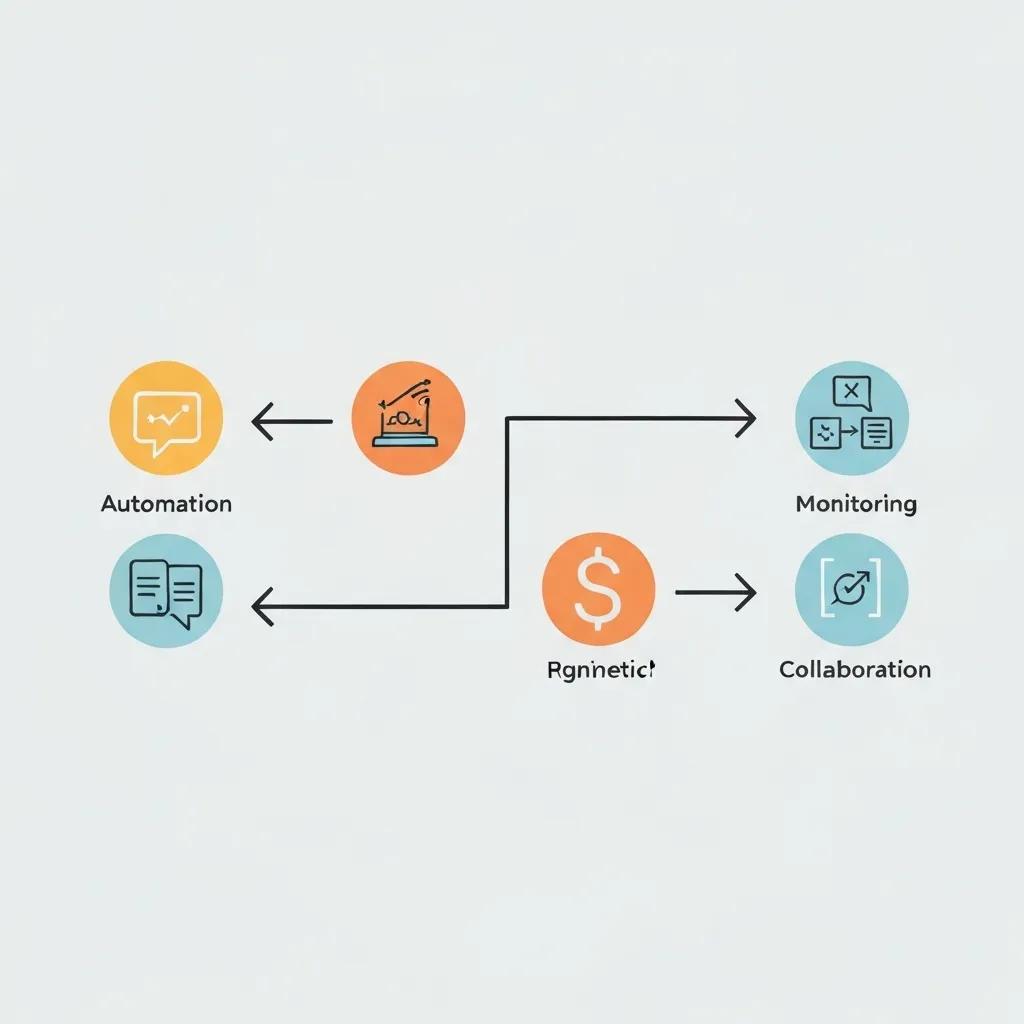
The Benefits of Choosing Platform Engineering Managed Services for Scaling Teams
Platform Engineering Managed Services streamline infrastructure orchestration, accelerate delivery pipelines, and improve developer productivity by abstracting complexity and providing self-service capabilities for growing teams. As an IT business owner, I’ve seen how unmanaged environments cause tool sprawl, deployment delays, and security gaps that slow innovation. In this guide, you’ll learn how these services define an Internal Developer Platform (IDP), tackle scaling challenges, boost Developer Experience (DevEx), ensure reliability, embed security, deliver cost efficiencies, and leverage CyberCommand’s co-managed IT approach for small businesses.
Key themes covered in this article:
- Definition and core components of Platform Engineering Managed Services
- Challenges of scaling teams and how managed solutions address them
- Productivity gains through self-service platforms, CI/CD, and workflow optimization
- Scalability, reliability, and Infrastructure as Code (IaC) enablement
- Security, compliance, and DevSecOps integration
- Financial advantages, ROI, and pricing models
- CyberCommand’s co-managed IT model and its benefits
- Decision criteria for small businesses and future trends in the space
By the end, you’ll understand why investing in these services with CyberCommand can transform your development operations from bottlenecked to business-accelerating.
What Are Platform Engineering Managed Services and How Do They Support Scaling Teams?
Platform Engineering Managed Services deliver a fully managed Internal Developer Platform (IDP) that abstracts cloud and infrastructure complexity, automates CI/CD pipelines, and embeds security guardrails—enabling scaling teams to focus on code and innovation. These services provide a unified interface for provisioning environments, orchestrating deployments, and monitoring performance, which dramatically reduces operational overhead and accelerates time to market.
Understanding this concept requires clarifying what platform engineering entails and how a managed model simplifies adoption.
What Is Platform Engineering and Its Role in Internal Developer Platforms?
Platform engineering is the discipline of designing, building, and operating an Internal Developer Platform (IDP) that standardizes development environments, automates resource provisioning, and enforces organizational policies. By consolidating infrastructure as code (IaC), container orchestration, and developer tools into a self-service portal, platform engineering empowers teams to spin up environments on demand without friction. This centralized approach promotes consistency, reduces configuration drift, and improves collaboration across DevOps, QA, and security functions.
These principles establish the foundation upon which managed services deliver turnkey platforms for scaling organizations.
Widespread Adoption and Strategic Importance of Platform Engineering
Industry analysis predicts that by 2026, 80% of large software engineering organizations will establish dedicated platform engineering teams, a notable increase from 45% in 2022. A 2025 study further reveals that 55% of global organizations have already adopted platform engineering, with 90% planning to expand its reach, underscoring its vital role in accelerating software delivery and improving developer productivity.
This citation reinforces the article’s premise that platform engineering is becoming a standard and essential practice for scaling teams, driven by its ability to streamline development and enhance productivity.
How Do Managed Services Simplify Platform Engineering for Growing Teams?

Managed services take on the operational responsibilities of platform engineering—such as infrastructure provisioning, pipeline maintenance, and monitoring—so internal teams can focus on product features instead of platform upkeep. Instead of hiring specialized engineers to build an IDP from scratch, businesses partner with a provider that orchestrates cloud resources, integrates CI/CD tools, and maintains platform reliability.
Key simplification benefits include:
- Automated upgrades of platform components and dependencies
- 24/7 monitoring with proactive incident management
- Standardized service catalog and self-service provisioning
- Ongoing optimization for performance, cost, and security
This model scales teams rapidly while minimizing talent gaps and cognitive load.
What Key Components Make Up Platform Engineering Managed Services?
The success of managed platform engineering hinges on delivering a cohesive set of foundational components. Below is an overview of the primary elements, their functions, and the benefits they provide.
| Component | Function | Benefit |
|---|---|---|
| Internal Developer Platform (IDP) | Provides a self-service portal for environment provisioning | Reduces wait times and tool fragmentation |
| Automation Frameworks | Orchestrates CI/CD pipelines and infrastructure as code | Ensures consistent, repeatable deployments |
| Continuous Integration/Delivery | Automates build, test, and deployment workflows | Speeds up release cycles and improves code quality |
| Security & Compliance Guardrails | Embeds policies as code and automates vulnerability scans | Enhances security posture and meets regulations |
| Monitoring & Observability | Collects metrics and logs across platforms | Enables proactive issue detection and resolution |
Why Do Scaling Development Teams Need Managed Platform Engineering Solutions?
Rapidly growing teams often encounter complexity that outpaces their internal capacity, leading to tool sprawl, unreliable pipelines, and talent shortages. Managed Platform Engineering Solutions address these pain points by delivering expertise, best practices, and automation that keep pace with organizational growth.
What Common Challenges Do Scaling Teams Face Without Managed Services?
Scaling teams typically struggle with:
- Cognitive Load Overhead: Balancing multiple tools and manual scripts increases developer frustration.
- Tool Sprawl: Uncoordinated adoption of CI/CD, monitoring, and infrastructure tools leads to integration headaches.
- Talent Gaps: Finding engineers experienced in Kubernetes, Terraform, and platform design can be difficult for small businesses.
These obstacles result in slower delivery, higher failure rates, and increased security risks—issues that managed services are designed to eliminate.
How Do Managed Services Reduce Operational Complexity for Scaling Teams?
Managed Platform Engineering abstracts complexity by unifying platform orchestration, deployment automation, and observability under a single managed umbrella. Key operational simplifications include:
- Centralized toolchain management to avoid compatibility conflicts.
- Automated scaling policies via IaC templates for predictable resource provisioning.
- Expert support for incident resolution, eliminating firefighting by internal staff.
By outsourcing platform operations to a specialist, development teams can dedicate more time to feature development and less to infrastructure maintenance, aligning with best practices outlined by VentureBeat on accelerating delivery through platform standardization.
How Does Platform Engineering Enable Efficient Team Growth and Collaboration?
Platform Engineering creates consistent interfaces—often called “paved paths”—that streamline workflows and foster cross-team collaboration. Common outcomes include:
- Self-service onboarding for new developers, cutting setup from days to minutes.
- Shared infrastructure patterns that reduce knowledge silos.
- Versioned IaC modules that promote code reuse and governance.
These efficiencies cultivate a culture of autonomy, allowing teams to grow without administrative bottlenecks.
How Do Platform Engineering Managed Services Boost Developer Productivity and Experience?

Delivering a seamless Developer Experience (DevEx) is critical for retaining talent and maximizing output. Managed Platform Engineering drives DevEx improvements by providing intuitive self-service portals, automation, and optimized workflows that eliminate repetitive tasks.
What Is Developer Experience (DevEx) and Why Is It Critical for Scaling Teams?
Developer Experience (DevEx) refers to the overall quality of interactions developers have with tools, platforms, and processes. High DevEx reduces time spent on configuration and debugging, directly impacting productivity and job satisfaction. For scaling teams, poor DevEx can lead to lower morale, increased turnover, and slower feature delivery.
Focusing on DevEx ensures a smoother journey from code commit to production release, fostering innovation and growth.
How Do Self-Service Platforms and Automation Improve Developer Efficiency?
Self-service provisioning and automated workflows allow developers to:
- Provision environments through a catalog of vetted templates.
- Deploy applications with a single command or click.
- Roll back changes automatically when failures occur.
These capabilities reduce context switching, minimize toil, and free developers to concentrate on writing high-quality code.
What Role Does CI/CD and Workflow Optimization Play in Enhancing DevEx?
Continuous Integration and Continuous Delivery (CI/CD) pipelines are the backbone of a modern dev workflow. Managed services optimize these pipelines by:
- Implementing parallel testing and deployment strategies.
- Integrating automated security and compliance checks early in the pipeline.
- Providing real-time feedback loops through integrated dashboards.
These optimizations shrink feedback cycles, increase release velocity, and deliver a predictable, secure development environment.
How Do Managed Platform Engineering Services Achieve Scalability and Reliability?
Managed Platform Engineering leverages Infrastructure as Code (IaC), microservices architecture, and cloud management to ensure platforms grow with demand and maintain consistent performance.
How Does Infrastructure as Code (IaC) Support Automated Scaling and Consistency?
Infrastructure as Code (IaC) defines infrastructure resources declaratively, enabling:
- Version control of configurations for auditability.
- Automated provisioning of new environments at scale.
- Uniform enforcement of standards across development, staging, and production.
This approach guarantees that infrastructure changes are repeatable, traceable, and scalable without manual intervention.
What Are the Benefits of Microservices and Cloud Management in Platform Engineering?
Microservices architectures decompose applications into loosely coupled services, which managed platforms orchestrate with container orchestration tools. Key benefits include:
- Independent scaling of components based on usage patterns.
- Fault isolation that prevents cascading failures.
- Flexible deployment strategies, such as canary releases and blue-green deployments.
By centralizing microservices management in a platform, teams gain elasticity and resilience.
How Do Managed Services Ensure High Availability and System Reliability?
Managed services implement best practices—such as multi-region deployments, health checks, and automated failover—to maintain uptime.
Continuous monitoring and alerting enable proactive remediation, while run-books and incident response procedures minimize downtime and safeguard business continuity.
How Do Platform Engineering Managed Services Enhance Security and Compliance?
Embedding security and compliance into the platform foundation is essential for protecting data, meeting regulations, and maintaining customer trust. Managed Platform Engineering Services integrate security practices at every stage of the development lifecycle.
What Security Challenges Are Addressed by Managed Platform Engineering?
Scaling teams face risks such as misconfigured cloud resources, outdated dependencies, and inconsistent policy enforcement. Managed services tackle these issues by:
- Automating vulnerability scanning of container images and IaC templates.
- Enforcing least-privilege access controls via single sign-on integrations.
- Applying security patches across the platform in a coordinated manner.
These measures reduce the attack surface and lower the likelihood of breaches.
How Are Security Best Practices and Compliance Integrated into Platforms?
Security and compliance are codified as policy-as-code within the platform:
- Pre-approved IaC modules include built-in guardrails.
- Automated checks verify adherence to standards such as PCI DSS or HIPAA.
- Audit logs capture every change for regulatory reporting.
This approach ensures that compliance is continuous and embedded, not retrofitted.
What Is the Role of DevSecOps in Platform Engineering Managed Services?
DevSecOps extends DevOps by integrating security responsibilities into development teams and pipelines. Managed services provide:
- Automated security gates in CI/CD workflows.
- Real-time threat detection and vulnerability alerts.
- Collaboration tools that bring security engineers into sprint planning.
This cultural shift promotes shared ownership of security outcomes.
What Are the Financial Benefits and Cost Efficiencies of Managed Platform Engineering?
Outsourcing platform operations can unlock significant cost savings by optimizing resource usage, reducing manual effort, and providing predictable pricing models.
How Do Managed Services Reduce Operational and Infrastructure Costs?
Managed Platform Engineering Services cut expenses through:
- Dynamic scaling that matches compute resources to real-time demand.
- Consolidation of tools under a unified platform to eliminate redundant licenses.
- Lower staffing overhead by leveraging the provider’s expertise and automation.
These efficiencies translate to lower monthly cloud bills and reduced internal support costs.
What Is the Return on Investment (ROI) for Small Businesses Using Platform Engineering?
Small businesses partnering with a managed provider often see:
- 30–50% faster release cycles, leading to quicker revenue recognition.
- 20–40% reduction in operational incidents, saving time and remediation costs.
- Increased developer productivity, allowing teams to deliver new features rather than firefight.
Combined, these improvements deliver a compelling ROI and accelerate growth.
The ROI of Operational Platform Excellence and Accelerated Time-to-Market
Investments in platform engineering capabilities have been shown to yield substantial returns, including a 3-5x increase in developer productivity, a 40-60% reduction in infrastructure costs, and 30-50% faster time to value. Leading adopters of platform engineering have also reported significantly accelerated time to market, with 71% indicating such improvements.
This research quantifies the direct financial and productivity benefits of adopting platform engineering, supporting the article’s claims about cost efficiencies, faster release cycles, and increased developer productivity.
How Do Pricing Models of Managed Services Support Budget Optimization?
Managed services typically offer tiered pricing or consumption-based models that align costs with usage. Common options include:
- Subscription Plans with fixed monthly fees for defined support levels.
- Pay-as-You-Grow pricing tied to resource consumption metrics.
- Hybrid Models combining base fees with per-incident billing.
These flexible structures help small businesses forecast IT expenses and scale budgets predictably.
How Does CyberCommand’s Co-Managed IT Approach Enhance Platform Engineering for Scaling Teams?
CyberCommand’s co-managed IT Services integrate seamlessly with internal teams to deliver platform engineering expertise without replacing existing staff. This hybrid collaboration model ensures that organizations retain control while benefiting from external specialization.
What Is Co-Managed IT and How Does It Complement Internal Teams?
Co-Managed IT provides specialized platform engineering support alongside your in-house IT or DevOps staff. CyberCommand augments internal capabilities through:
- Joint governance and shared responsibility frameworks.
- Dedicated platform engineers working within client processes.
- Knowledge transfer sessions to upskill internal teams.
This partnership model accelerates platform maturity and fosters continuous improvement.
How Does CyberCommand Augment Expertise and Provide Custom Solutions?
CyberCommand leverages deep expertise in cloud migrations, security, and automation to craft tailored IDP solutions. Our process includes:
- Collaborative design workshops to align platform features with business goals.
- Custom IaC modules and pipeline templates that fit your tech stack.
- Ongoing optimization based on performance metrics and cost analytics.
This bespoke approach ensures the platform meets unique organizational needs.
What Are the Benefits of Hybrid Platform Engineering Management?
A co-managed IT model delivers:
- Flexibility to scale support up or down as project demands shift.
- Control over critical workloads while offloading routine tasks.
- Transparency through shared dashboards and regular reporting.
Together, these advantages accelerate platform adoption and mature internal processes.
For more on this collaboration model, explore our Co-Managed IT Services.
How Can Small Businesses Determine If Platform Engineering Managed Services Are Right for Them?
Assessing readiness involves evaluating current pain points, resource constraints, and growth objectives to decide if managed platform engineering aligns with business needs.
What Key Indicators Show a Need for Managed Platform Engineering?
Look for signs such as:
- Frequent deployment failures or rollback incidents
- Developers spending more time on infrastructure than feature work
- Escalating cloud bills due to unmanaged resource usage
- Difficulty enforcing security policies across environments
These indicators suggest that a managed approach can deliver immediate relief and long-term efficiency gains.
How Do Platform Engineering Services Address Small Business Constraints?
Managed services help small businesses by:
- Eliminating the need to hire rare platform engineering talent.
- Providing predictable, usage-based pricing to fit limited budgets.
- Bundling best-practice automation and security into a single subscription.
This combination reduces upfront investment and delivers enterprise-grade capabilities.
What Common Questions Do Small Businesses Have About Platform Engineering?
Small business leaders often ask:
- “How quickly can we see ROI from these services?”
- “Can we integrate with our existing cloud provider and tools?”
- “What level of customization vs. out-of-the-box functionality is available?”
- “How is support structured and what SLAs apply?”
Understanding these considerations—along with clear service definitions—helps businesses make informed decisions about adopting managed platform engineering.
What Are the Future Trends and Innovations in Platform Engineering Managed Services?
The platform engineering landscape is evolving rapidly, with AI-driven automation, sustainability practices, and new IaC paradigms shaping next-generation offerings.
How Is AI Augmenting Platform Engineering and Automation?
AI and machine learning algorithms are being integrated to:
- Predict workload performance and auto-scale proactively.
- Analyze log patterns for anomaly detection.
- Generate IaC templates based on historical usage.
These innovations promise to further reduce toil and increase platform resilience.
What Role Will Infrastructure as Code and Green Software Practices Play?
Declarative IaC is extending beyond provisioning to include energy-efficient resource policies. Green software principles promote carbon-aware scheduling and optimized compute usage, helping organizations meet sustainability goals while controlling costs.
How Will Platform Engineering Adoption Evolve for Scaling Teams by 2025 and Beyond?
Industry projections indicate that over 80% of engineering organizations will have dedicated platform teams by 2026. Platforms will become more composable, integrating event-driven architectures and service meshes out of the box. This maturation will make managed platform engineering an essential growth partner for scaling businesses.
Choosing Platform Engineering Managed Services from CyberCommand empowers small and mid-sized businesses to overcome operational complexity, accelerate software delivery, and bolster security—all without the overhead of building and maintaining an in-house platform team. Explore our Managed IT Services for Mid-Sized Businesses or contact us to discuss a co-managed IT strategy that aligns with your scaling goals.






